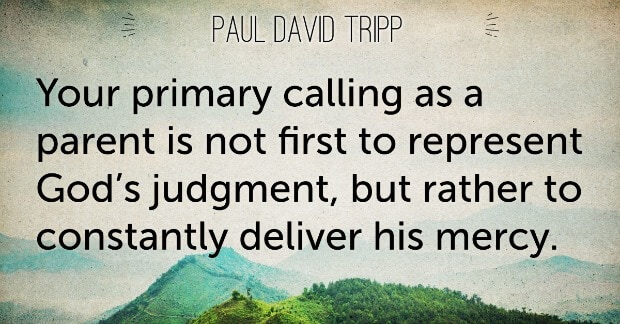
Paul David Tripp is a pastor, author, and international conference speaker. He is the president of Paul Tripp Ministries and has written more than a dozen books on Christian living, including his newest book Parenting: 14 Gospel Principles Than Can Radically Change Your Family.
One of the biggest errors Christian parents make is to forget. Not forgetting the baby’s diaper bag. Not forgetting to pack the school lunch. Not forgetting to pick the teenager up after practice.
No, there’s something much bigger that we forget.
When we, as earthly mothers and fathers, forget the daily mercies we’ve received from the Heavenly Father’s hands, mercies we could have never earned, deserved, or achieved, it becomes much easier for us not to parent our children with mercy.
What is mercy? Mercy is tenderheartedness and compassion toward someone in need. Our children are just that—needy. They need guidance and protection, they need help and rescue, they need wisdom and instruction, they need confrontation and discipline, they need patience and grace, they need love and compassion, they need support and provision, and they need to see God and themselves with accuracy.
There’s never been a day when your children haven’t needed mercy. We’ve been called to parent precisely because of their sin, weakness, and failures. Every moment of the foolishness and failure of our children should remind us why the heavenly Father provided children with parents. Because of this, your primary calling as a parent is not first to represent God’s judgment, but rather to constantly deliver his mercy.

That’s an incredibly high and holy calling, but it will also prove to be perhaps your most difficult calling. I don’t know about you, but mercy simply isn’t natural for me. It’s natural for me to be harsh. It’s natural for me to be demanding and impatient. It’s natural for me to be a bit irritated that I have to repeat myself.
It’s natural for me to be more upset by the wrongs of my children than I am of my own. It’s natural for me to want life to be easy and predictable and to be upset with my kids who get in the way of my plan. It’s natural for me to find it more comfortable to have the family around me agree with me rather than debate me.
I’m not always compassionate, and I don’t always have a tender heart. I don’t always respond with love and communicate with grace. I have to confess: there are times when I’m a pretty poor representative of God’s mercy. I’m sure that I’m not alone in my struggle. How well have you pictured God’s mercy in the way you’ve responded to your children in the last month?
That’s why I need to remember, and I suspect you do too. We need to remember all the mercies that our Heavenly Father has showered on us so we in turn can shower our children with mercy.

No parent gives mercy better than one who is convinced that they desperately need mercy themselves. So, here are 8 passages from Scripture that remind us of our need for mercy and the mercy that God so generously delivers to us:
- “Surely goodness and mercy shall follow me all the days of my life, and I shall dwell in the house of the Lord forever.” (Psalm 23:6)
- “Blessed be the Lord! For he has heard the voice of my pleas for mercy.” (Psalm 28:6)
- “As for you, O Lord, you will not restrain your mercy from me; your steadfast love and your faithfulness will ever preserve me!” (Psalm 40:11)
- “Who redeems your life from the pit, who crowns you with steadfast love and mercy.” (Psalm 103:4)
- “The Lord is good to all, and his mercy is over all that he has made.” (Psalm 145:9)
- “Therefore the Lord waits to be gracious to you, and therefore he exalts himself to show mercy to you.” (Isaiah 30:18)
- “But God, being rich in mercy, because of the great love with which he loved us.” (Ephesians 2:4)
- “Let us then with confidence draw near to the throne of grace, that we may receive mercy and find grace to help in time of need.” (Hebrews 4:16)
You see, parenting is all about being God’s ambassadors in the lives of our children. It’s about faithfully representing his message, his methods, and his character to our children. It’s about working to make the invisible mercy of God visible as we respond with mercy toward our children.
That last verse on my list, from Hebrews 4:14–16, explains to us exactly what that looks like. Jesus was willing to subject himself to the hardships of life in this fallen world and be tempted in all the ways that we are, so that he would be an understanding high priest, able to sympathize with our weaknesses.
The word that is used for weaknesses in verse 15 is used elsewhere in the Bible to refer to many different kinds of weakness. It really could be translated that Jesus is able to sympathize with the human condition or with our human frailty. Because he can sympathize with us, we can rest assured that he’ll bless us with mercy that is form-fitted for the need of the moment.
Parents, that’s our model. Allow yourself to reflect on how much you need God’s mercy now, reflect on how much you needed the mercy of your parents as you grew up, and let sympathy grow in your heart.
So what would it look like to parent with mercy?
Mercy isn’t about being wishy-washy. Mercy isn’t about letting down your standards. Mercy isn’t about acting as if the bad things your children do are okay. Mercy doesn’t mean that you abandon discipline and correction. Mercy doesn’t mean that you quit holding God’s law before your children. Mercy isn’t letting your children decide what they’re not mature enough to decide or control what they aren’t able to control. Mercy isn’t about always saying yes and never saying no.
Mercy is parenting with a tender heart. Mercy isn’t taking your children’s failures personally, but viewing their struggles with compassion. Mercy is about blessing your children with your patience. It’s about being as careful to encourage as you are to rebuke. It’s about discipline that is kind and correction that is gentle.
Mercy is about being firm and unyielding and loving at the same time. It’s about refusing to indulge your irritation and your anger. If you’re parenting with mercy, you don’t condemn your children with a barrage of harsh words. If you’re parenting with mercy, you don’t compare your righteousness to your children’s sin, letting them know that their problem is that they’re not like you.
Mercy means not allowing your heart to grow bitter or cold. It’s about always being ready to forgive, not making your children pay today for the sins of yesterday. Mercy is about moving toward your children with love even in those moments when they don’t deserve your love. Mercy is about being willing to do things again and again without throwing it into your children’s faces that you have to repeat yourself. It’s about refusing to motivate your children by shame and threat.
Here’s what mercy means for your parenting: mercy means that every action, reaction, and response toward your children is tempered and shaped by tenderness, understanding, compassion, and love.
Parenting is a lifelong mission of humbly, joyfully, and willingly giving mercy.
***
This post has been adapted from Paul Tripp’s newest book, Parenting: 14 Gospel Principles Than Can Radically Change Your Family.




